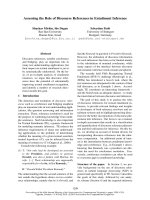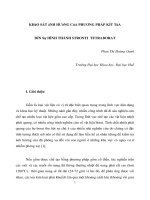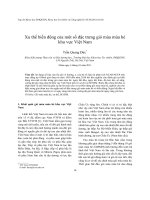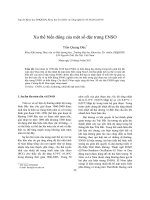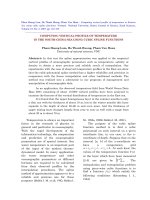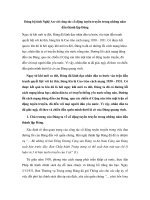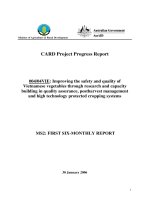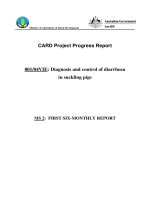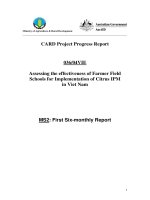Báo cáo nghiên cứu khoa học " Assessing the effectiveness of Farmer Field Schools for Implementation of Citrus IPM in Viet Nam " ppt
Bạn đang xem bản rút gọn của tài liệu. Xem và tải ngay bản đầy đủ của tài liệu tại đây (707.75 KB, 27 trang )
1
Ministry of Agriculture & Rural Development
Assessing the effectiveness of Farmer Field Schools
for Implementation of Citrus IPM in Viet Nam
CARD 036/04VIE
Project Completion Report
2008
1
1. Institute Information
Project Name
Assessing the effectiveness of Farmer
Field Schools for Implementation of
Citrus IPM in Viet Nam
Vietnamese Institution
Plant Protection Department
Vietnamese Project Team Leader
Mr Ho Van Chien
Australian Organisation
University of Western Sydney
Australian Personnel
Oleg Nicetic, Robert Spooner-Hart,
Debbie Rae
Date commenced
February 2005
Completion date (original)
February 2007
Completion date (revised)
September 2007
Reporting period
2005-2006
Contact Officer(s)
In Australia: Team Leader
Name:
Oleg Nicetic
Telephone:
+61245701329
Position:
Research Officer
Fax:
+61245701103
Organisation
University of Western Sydney
Email:
In Australia: Administrative contact
Name:
Gar Jones
Telephone:
+6124736 0631
Position:
Director, Research Services
Fax:
+6124736 0905
Organisation
University of Western Sydney
Email:
In Vietnam
Name:
Mr Ho Van Chien
Telephone:
+8473834476
Position:
Director
Fax:
+8473834477
Organisation
Southern Regional Plant Protection
Centre
Email:
2
2. Project Abstract
3. Executive Summary
Citrus is an important fruit crop in Vietnam but the amount of fruit produced per hectare is
much lower than in Australia or other major citrus producing countries. The aim of this
project was to improve citrus production through better control of pests and diseases and
improved management of citrus plantations. A baseline study showed that the estimated net
profit per hectare of citrus varied between 30,000 and 130,000 VND. The area of citrus farms
and the variety of citrus grown also varied considerably between provinces with mandarins
returning the highest profits. The aims of the project were successfully achieved by
increasing the capacity of the Vietnamese research and extension institutions to teach farmers
more effective citriculture methods and by increasing the knowledge of the farmers involved
in the project. The key learning model used in the project was Farmer Field Schools (FFS)
with the schools providing a platform for a participatory based learning and action based
research. Initially the key stakeholders developed a training program for extension workers,
who trained in citrus integrated pest management (IPM) and developed a curriculum for FFS.
The trainers then conducted FFS for a season incorporating adaptations for their particular
regions during the course of the schools. At the end of the season review meetings were held
in central locations to evaluate the FFS and make revisions to the training program and the
FFS curriculum. Revisions in the second year included extending the duration of the FFS to
include all the major stages of citrus growth and development by having less frequent FFS
meetings and the focus of training was widened from IPM to include other aspect of
citriculture including pruning, plant nutrition in particular production of compost, planning of
rejuvenation of orchards, budgeting and planning for the production cycle. In the first year of
the project 98 extension workers from 12 provinces were trained and they conducted 24 FFS
from which 728 farmers graduated. In the second year of the project an additional 111
extension workers were trained and they conducted 48 FFS from which 1520 farmers
graduated. In the first year of the project trainers from Can Tho developed 12 educational
posters on major citrus pests and diseases. At the beginning of the second year of the project
Citrus is an important fruit crop in Viet Nam but productivity and production are impeded
by pests and diseases. Integrated pest management (IPM) is widely recognised as an
effective and sustainable method of pest and disease control. Viet Nam has a well-
developed National IPM program of farmer participatory training and research using
Farmer Field Schools (FFS), which has trained more than 500,000 farmers in IPM
technologies for rice, vegetable, cotton, tea, soybean, peanut, and sweet potato crops.
Prior to this project few trainers had specific skills in citrus IPM. This project has greatly
increased the Vietnamese capacity to train farmers in citrus IPM by training 209 extension
workers in the Mekong Delta and the Central Coast regions. These extension workers
subsequently facilitated a total of 72 FFS during 2005 and 2006 resulting in 2,245 farmers
completing season long training in citrus IPM across 12 provinces. Assessment of the
effectiveness of FFS demonstrated that farmers observed more beneficial organisms in
their orchards, they adopted more IPM compatible pesticides, reduced their input costs
and increased sharing of knowledge and experiences resulting in formation of
cooperatives. The cost of FFS per participant represented around 1.6% of average net
profit of surveyed farmers.
3
copies of these posters were printed on waterproof material for each FFS using additional
funds provided by ACIAR. A book entitled “IPM on citrus-Ecological Guide” was also
published at the end of the first year of the project and 1030 copies distributed to
participating trainers and farmers. The book was so well received that an additional
photocopied version of the book was produced and distributed to FFS participants. At the end
of the project a second book entitled ‘Field guide for pest and diseases of citrus’ was
published with 5030 copies being distributed to trainers and FFS participants. A survey of the
knowledge, attitudes and practice (KAP) of participating farmers conducted at the beginning
and end of each FFS school showed that attitudes of farmers were influenced by participation
in FFS. Their knowledge about pests and diseases significantly improved and the number of
sprays applied decreased. At the end of the project an assessment of economic, social and
environmental impacts was conducted using individual interviews of 53 farmers from 13
locations. This survey found that in the year following FFS, farmer practices changed
considerably resulting in a reduction of pesticide use, change of type of pesticide used from
broad spectrum pesticides with high negative environmental impacts to softer pesticides,
better soil management with increased use of organic material and better canopy
management. Farmers also increased their awareness about spray application, record
keeping, post harvest and marketing. A majority of farmers claimed their net profits
increased as a result of reduced financial inputs and increased yield and fruit quality.
Participation in FFS increased mutual respect between FFS participants and facilitated the
transition of farm management from men who had employment outside the farm, to their
wives. The formation of cooperatives after completion of FFSs has been a very important
first step in sustaining increased capacity of farming communities to improve citrus
production after completion of FFSs. However, to sustain these benefits, farming groups
need financial support with credit facilities enabling them to open post-harvest operations in
order to improve market access. Maintenance of the network of trainers developed as result
of this project requires continuing funding. Although this could initially be provided by
provincial governments, the possibility that farmers contribute to the cost of FFS through a
small levy or contribution should be considered in the future, especially if farmers are
members of citrus clubs or cooperatives. The cost of FFS per participant was estimated at A$
70.62, which was only 1.60% of the estimated average net profit per hectare. Based on these
estimates the cost of FFS would be offset in just one season due to the reduction of inputs
and increased yield.
4
4. Introduction & Background
Citrus fruit is one of the major fruit crops in Vietnam (MARD 2004) and citrus production is
an important source of income for many Vietnamese farmers. However, productivity and
production of citrus in Vietnam is considerably lower than in Australia and major citrus
producing countries of the world such as Brazil and the USA. It has been stated by MARD
that “in general, citrus cultivation has not been significantly developed over the past few
years, largely because of the serious damage of pests and diseases, especially greening
disease (officially known as huanglongbing) and therefore studies on their control methods,
in combination with managing citrus plantations and using advanced and intensive
technology is a vital necessity” (MARD 2004).
Background information about citrus production in the regions in which this project was
conducted was collected as a part of baseline study and impact assessment using farmer
surveys and interviews. From the information collected the average size of citrus orchards
and farmers net income was estimated for each province. It was very difficult to verify
farmers’ statements because farmers did not keep accurate records of inputs and outputs.
However the interviewer did verify with each farmer that they talking about net income not
total income. It was also verified with each group of farmers that the estimated net income
represented the difference between total value of sold fruits and the costs of immediate inputs
like fertilizer, pesticide, irrigation fees, cost of petrol used in production, cost of hired labour,
cost of packaging and transportation to the market. In calculating net profit, farmers did not
include costs of their own or family labour inputs, depreciation of equipment and orchard or
interest they paid on loans taken to support production. The average size of citrus farms
varied considerably between provinces and was largest in Kanh Hoa (Figure 1) Estimated net
profit values was not related to farm size (Figure 2) and profitability varied between citrus
species when averaged over provinces (Figure 3).
There is a high degree of specialisation in the varieties of citrus grown within provinces in
Vietnam, with farmers in Dong Thap almost exclusively growing mandarins (Tieu) and
farmers in Nhge An provinces almost exclusively growing oranges. Pomelo is grown in a
majority of provinces and the area planted has increased in the last decade. Different varieties
of citrus provide very different returns to farmers. While the mean net profit averaged over
citrus species and provinces was VND 78,620,000, farmers growing mandarins had the
highest average net return of VND 100,000,000 followed by pomelo growers with VND
93,330,000 while farmers growing oranges only had an average profit of VND 37,880,000
(Figure 3). Not surprisingly the highest profits of over 100,000,000 VND were recorded in
Tien Giang and Dong Thap provinces where mandarins are predominantly grown. Compared
with the net profit from rice the net returns from citrus is 3 to 6 times higher.
5
0
0.5
1
1.5
2
2.5
3
Kanh Hoa Nghe An Ben Tre Tien Giang Dong Thap Tra Vinh Vinh Long Can Tho Soc Trang
Province
Average area of citrus plantation (ha)
Figure 1: Average size of citrus farms for each of the provinces surveyed.
0
20,000,000
40,000,000
60,000,000
80,000,000
100,000,000
120,000,000
140,000,000
160,000,000
180,000,000
Kanh Hoa Nghe An Ben Tre Tien Giang Dong Thap Tra Vinh Vinh Long Can Tho Soc Trang
Province
Net profit (VND/ha/year)
Figure 2: Estimated net income per hectare of citrus orchard for each of the provinces
surveyed.
6
0
20,000,000
40,000,000
60,000,000
80,000,000
100,000,000
120,000,000
140,000,000
Mandarin Pomelo Orange
Citrus species
Net profit (VND/ha/year)
Figure 3: Estimated net income per hectare averaged across all provinces surveyed for each
of the three major citrus species.
The objectives of the project were to conduct Training of Trainers (TOT) for extension
workers in citrus IPM, for these trainers to conduct FFSs in their local region and to assess
the effectiveness of the FFS model in increasing farmer knowledge. Key aspects of farmer
knowledge that were targeted were an increased understanding of the orchard ecosystem, the
influence of tree density and tree architecture on orchard productivity, the balance between
organic and inorganic nutrients for maintaining soil health, the equilibrium between
beneficial and pest arthropods, and optimising pesticide use in citriculture. These objectives
have contributed to the empowerment of citrus farmers by enhancing their ability to make
better-informed decisions about pest and disease management through the adoption of IPM
strategies in citrus production in Viet Nam. With the establishment of a network of citrus
IPM extension workers and these trainers gaining essential practical experience in citrus IPM
training by holding at least one season long FFSs in citrus, the Vietnamese capacity to
implement citrus IPM programs has been significantly enhanced.
The key learning model used in the project was Farmer Field School (FFS). The FFS was
used as a platform for a participatory based learning and action based research. The model
has successfully engaged all stakeholders: farmers, extension workers, researchers, local
government officials and private industry and allowed them to direct the learning and
research to best meet their needs. An equally important aspect of the project was to assess the
effectiveness of FFS in changing farmer practices and the economic, social and
environmental impact of those changes. Although the methodologies for participatory based
learning and action based research are well established, those for impact evaluation are still
under development and as yet there is no agreed methodological framework. It is generally
agreed however, that assessment of the FFS impact is complex because of the diversity of
impact parameters and the different perspective held by stakeholders on what constitutes
impact (van den Berg and Jiggins 2007). Assessments used in this project included self-
7
evaluation by farmers and self-evaluation by other project stakeholders in order to ensure that
parameters evaluated were those that were most relevant to the primary stakeholders. Large
sample sizes and triangulation (surveys, semi-structured interviews and field observations)
were used to minimise bias. Impact was measured using a longitudinal comparison (e.g. a
comparison before and after training). Impacts can sometimes be confounded by temporal
variations such as differences in yield and market prices from year to year. To reduce the
impact of temporal variation the impact study was performed across different regions, in 9
provinces and on different citrus species (oranges, mandarins and pomelo).
5. Progress to Date
5.1 Implementation Highlights
The key objective of this project was to increase the Vietnamese capacity to develop and
implement citrus IPM strategies by conducting Training of Trainers (TOT) for extension
workers in citrus IPM and these trainers then conducting FFSs in their local districts. The key
objective was achieved through implementation of all the activities documented in the project
contract, and the implementation of additional activities that were formulated through
engagement and interactions between Vietnamese stakeholders during the course of the
project. These additional activities significantly contributed to the positive impact on
implementation and sustainability of the implemented project objectives.
Details of project implementation are documented in the Milestone reports, and the major
highlights are listed below.
Project management highlights
1. Project planning meeting held on 25 January 2005 at which project milestones and
deliverables were outlined. Agreement was reached on personnel that would undertake
specific tasks and dates for implementation of the tasks were set.
2. Key stakeholder beneficiary meeting on 22 March 2005. The stakeholders meeting
provided a stage for interface between stakeholders from research and extension
institutions, private industry and NGOs. Representatives of institutions and private
industry not originally included in the project participated at the stakeholder meeting and
expressed their willingness to participate and support the project. At the meeting the
locations of FFS were decided and the TOT program drafted.
3. The review workshops were held in Can Tho on the 23 November, My Tho on the 25
November and Vinh on the 29 November 2005. The review meetings were not planned or
budgeted in the project proposal but during the course of the first season of FFSs it
became clear that workshops that would provide the opportunity for stakeholders
(including farmer representatives from FFSs) to evaluate the first season of FFSs and
formulate changes to the curriculum were essential. To finance this activity sponsorship
from Bayer Vietnam was secured. At these meetings the results of demonstration trials
conducted by farmer in FFSs were reported by trainers, TOT and FFS training programs
were evaluated, feedback provided and revisions to the TOT and FFS curriculum for
2006 were agreed on.
4. A stakeholder meeting was held at the Southern Regional Plant Protection Centre on
Monday 9 January. At this meeting the TOT training program was adjusted to include
more practical activities, the revised timing of FFS was agreed on and additional funding
8
provided by SK Energy from Korea and UWS was committed to provide extra resources
to farmers.
5. Final review workshops sponsored by SK Energy were held on 27/11/06 in Can Tho, on
28/11/06 in My Tho and on 30/11/06 in Vinh. At the workshops results of the second
season of FFSs were evaluated. The IPM strategies relevant for specific regions were
formulated. Suggestions for the implementations of the “new” CARD project 037/06 VIE
on GAP in citrus were noted.
Training activities highlights
1. First TOT course for 2005 conducted from 18-29 April in SRPPC. Total of 47 extension
workers from 12 provinces were trained.
2. Second TOT course for 2005 conducted from 9-20 May in SRPPC. Total of 51 extension
workers from 12 provinces were trained.
3. Twenty-four FFSs commenced in 12 provinces at the end of May or early June 2005.
4. The additional activity of farmer study tours were conducted from the 24-29 October
2005 with a total of 540 farmers from 18 FFS in 8 provinces in the Mekong Delta visiting
a FFS in another province. Farmers from seven provinces visited Lai Vung district in
Dong Thap province and farmers from Lai Vung visited Cai Bei district in Tien Giang
province (see Box 1).
5. FFSs were completed in late October to early November 2005. A total of 728 farmers
were trained.
6. Significant changes in TOT and FFSs curriculum were made after the first season of
FFSs. Focus was widened from IPM to other aspect of citriculture including pruning,
plant nutrition in particular production of compost, planning of rejuvenation of orchards,
budgeting and planning for the production cycle. The focus within IPM that was
primarily on control strategies for citrus psillids-citrus greening diseases and mites was
extended to include phytophthora disease on citrus. Personnel trained as part of CARD
052/04 VIE project “Management of Phytophthora diseases in Vietnamese Horticulture
were included in our project.
7. First TOT course for 2006 was conducted from 13-26 February in SRPPC. Total of 45
extension workers from 9 provinces were trained.
8. Second TOT course for 2006 conducted from 27 February – 11 March. Total of 45
extension workers from 8 provinces were trained.
9. Third TOT course for 2006 conducted from 13-26 March. Total of 21 extension workers
from 4 provinces were trained.
10. Forty-eight FFSs commenced between March and May 2006 in 11 provinces. The FFSs
were conducted over a longer period of time covering all major phenological fazes of
citrus trees from flowering to harvest. The FFSs were completed by the end of December
2006. A total of 1530 farmers were trained.
Publication of reference material
1. During the first season of FFSs in 2005 trainers from Can Tho PPSD developed a set of
12 educational posters, 8 posters covering major pests on citrus and 4 posters covering
the major diseases. Posters printed on waterproof plastic material were presented at the
first review workshop in November 2005. The project management team evaluated
posters and concluded that they could be a valuable teaching tool in FFS. In March 2006
9
posters were produced and distributed to each FFS held in 2006 (Fig. 10). Funds were
provided from ACIAR (A$ 5,000) and UWS (A$ 3,000).
2. The book entitled “IPM on citrus-Ecological Guide” was published on 15/12/2005 and
1030 copies were distributed to all participating trainers and the majority of farmers in
April 2006. The book was very well accepted and an additional photocopied version of
the book or parts of the book were produced and distributed to FFS participants (Fig. 11).
Residual funds from CARD pilot project on citrus (2001-2004) were used to cover the
cost of printing.
3. The book entitled ‘Field guide for pest and diseases of citrus’ was published on
12/2/2007 and 5030 copies were distributed to trainers and FFS participants.
4. A leaflet that outlined IPM strategies for control of major pest and diseases of citrus was
printed (10,000 copies) by Saigon Plant Protection Company (SPC) and distributed to
participants of FFS and to ‘pesticide shops’ within distribution area of SPC. Publishing of
the leaflet was a very important step in aligning recommendations and marketing efforts
of pesticide producers with the recommendation of extension services.
Assessment of FFSs effectiveness in implementation of IPM
1. Surveys and analysis of farmers’ knowledge, attitude and practices (KAP) were
conducted in 2005 and 2006. A total of 1060 pre and post FFS attendance surveys from
530 farmers were analysed in 2005 and a total of 2118 pre and post FFS attendance
surveys from 1059 farmers were analysed in 2006.
2. Australian and Vietnamese project personnel visited 16 FFS in 12 provinces from 1-19
June 2005 baseline data were collected and teaching demonstration trials implemented.
3. During participatory evaluation of the process at the end of the first year it was concluded
that results of KAP analysis did not capture the essence of the FFSs impact on farmers
and their community. The project team together with trainers then developed other
assessments tools including semi-structured interviews and group discussion in an
attempt to improve the assessment.
4. Australian and Vietnamese project personnel visited FFS in southern Vietnam and
attended meetings at the Southern Regional Plant Protection Centre and Vinafruit in Ho
Chi Minh City from 21-24 March 2006.
5. Australian and Vietnamese project personnel visited 10 FFS in 9 provinces from 13-24
June 2006 to collect baseline data for FFSs commenced in 2006 and assist with teaching
demonstration trials implementation.
6. Australian and Vietnamese project personnel visited nine provinces were FFS were being
conducted from 17-30 November 2006 and undertook an assessment of economic, social
and environmental impacts using individual semi structured interviews and group
discussion with farmers that gradated from FFSs at the end of 2005. The additional
activity of evaluating each site for compliance with EUREP GAP was conducted in order
to establish the difference between Vietnamese citrus farmer production practices and
EUREP GAP requirements.
5.2 Smallholder Benefits
The individual situation of small holders was investigated in detail in a farmer practice
baseline study conducted at 16 FFS in June 2005 and 10 FFSs in Jun 2006, and during an
assessment of economic, social and environmental impacts using individual interviews of 53
10
farmers from 13 locations in November 2006. It was found that there are marked differences
in the agro-ecological systems and citrus growing practices used in the Mekong Delta and the
Central Coast region (including Nghe An province), and also considerable differences
between provinces within these regions. Detailed results from impact assessment analysis can
be found in Milestone 7 and only the major findings will be presented here.
Farmers increased their knowledge and skills for many components of citriculture including
density of plantings, pruning, plant nutrition and integrated pest management. Farmer
awareness about spray application, record keeping, post harvest and marketing was increased
but it was found that competence needed to be further increased in these areas. Farmers’
ability to critically evaluate the process of production and elements of the agro-ecosystem
was improved as a result of FFS. In the year following FFS, farmer practices changed
considerably resulting in a reduction of pesticide use, change of type of pesticide used from
broad spectrum pesticides with high negative environmental impacts to softer pesticides,
better soil management with increased use of organic material and better canopy
management.
The KAP analysis showed that attitudes of farmers were influenced by participation in FFS
particularly in relation to pest control methods. Farmers increased their level of agreement
that pesticide can cause pest resurgence and agreed less to the statements that application of
pesticide will increase the yield, that pesticides are cheap and easy to use, and that advanced
farmers use a lot of pesticide. Farmers’ knowledge about pests and diseases significantly
improved as a result of participation in FFSs, with a significant increase in number of farmers
giving correct answers recorded across all provinces but with steeper increase at Central
coast due to the lower level of knowledge at the beginning of FFSs (Figure 7). As citrus is a
perennial crop with a year-long growing season, most practices were not possible to change
within the timeframe of FFS. The only change of practice recorded was a reduction of
number of sprays in Mekong delta from 7 to 6.5 and from 7.7 to 6.0 in 2005 and 2006,
respectively.
Figure 4: Farmers increased their knowledge and skills for many components of citriculture
including density of plantings, pruning, plant nutrition and integrated pest management
11
Figure 5: Reduction in the number of sprays, change to less toxic pesticide and farmers
increased awareness of OH&S issues are some of project outcomes.
A majority of farmers claimed that as a result of changed practices their net profits increased,
partly as a result of reduced financial inputs and partly from increased yield and fruit quality
Overall 47% of interviewed farmers declared reduction in costs. Increased yield was also
frequently noted with only Vinh Long province farmers not reporting an increase in yield.
Overall 38% of interviewed farmers mentioned increase in yield, 17% increase in quality of
fruit, 17% increase in sale price of fruit and 13% increase in profit. It is not possible to
establish what proportion of the increased yield declared is due to changed management
practices and how much is due to seasonal variation.
Participation in FFS increased mutual respect between FFS participants and also increased
the status of the farmers within the wider farming community. Strengthened networks
between farmers facilitated the formation of farmers clubs and cooperatives which include
FFS participants and members of the wider farming community. Within these farmer
associations, FFS participants have taken leadership roles.
Although the level of female participation in FFS, particularly in the south, was not high, it
resulted in major impacts on the position of women in the family. Attendance at FFS
facilitated the transition of farm management from men who had employment outside the
farm, to their wives. As opportunities for finding employment in sectors other than
agriculture increase in the future, the need for women to take a leading role in agricultural
production will increase. This project has demonstrated that FFS training can effectively
assist women in this process.
There was also a small proportion of children of farming families attending FFS and although
it may seem that their attendance would offer similar opportunities for transition of farm
management, as was seen with working husbands and their wives, this potential was not as
effectively realised. Generational hand over of management is often the subject of
contention, and it seems that FFS was best able to facilitate this when children (sons) were
provided with a portion of the farm that they independently managed.
12
Fig 6: Farmers learned to indentify major pest, disease and beneficial insects in citrus orchard
13
Figure 7: Importance of pests and diseases ranked by farmers a) in the Mekong delta and b)
Central coast. Note a sharp increase in farmer’s awareness of the importance of Asiatic citrus
psyllid in transmission of citrus greening disease (huanglongbin)
15.8
4.8
12.7
0.8
1.6
10.227
14.5
3
9.6
12.8
3.6
13.7
0.1
0.8
13.2
31.9
10.4
4
9.5
a) Mekong Delta 2006
Pre FFS Post FFS
Scales & Mealybugs
Leafminer
Mites
Branch borer
Stink bug
Psylla
Greening disease
Root rot
Scab
Others
b) Central Coast 2006
Pre FFS Post FFS
11.8
20.7
21.85.2
0
6.6
17
10.3
1.8
4.8
4.2
23.9
19.7
2.8
0.7
22.2
15.5
7.7
0.4
2.9
Scales & Mealybugs
Leafminer
Mites
Branch borer
Stink bug
Psylla
Greening disease
Root rot
Scab
Others
14
5.3 Capacity Building
This project has greatly enhanced the capacity of the PPD to facilitate farmer participatory
training in citriculture and management of citrus pests and diseases. Over the course of the
project 209 extension workers undertook training conducted by 11 key scientists. The level
of competency of the trainers after completion of the training was assessed and shown in
Table 1. Trainers subsequently facilitated 72 FFS in 12 provinces in the Mekong Delta and
Central Coast regions of Viet Nam (Table 2). In 2006 additional 4 FFS were completely
funded by the provincial government. The participatory approach provided a framework
within which the pluralism of ideas of the trainers can be harnessed, adapted and refined in
consultation with farmers in order to provide effective solutions for the farmers.
In addition to the formal training provided in TOTs and FFSs, this project provided a range
of opportunities for the development of linkages between extension agencies and research
institutions. A very strong linkage was formed between PPD research centre (SRPCC) and
Can Tho University and SOFRI resulting in valuable input of scientists and researchers to
FFS curriculum and training. FFS trials included strategies for control of citrus greening that
were still developing as a part of CIRAD and ACIAR projects with SOFRI providing
researchers opportunity to work with farmers in evaluation of new strategies and allowing
farmers and trainers to develop solutions to their problems using the latest technologies.
Further as result of these linkages two practical field guides for farmers and trainers were
written and published (see implementation highlights).
The Australian team realised during the first year of this project that most of the necessary
skills and expertise in managing citrus pest and diseases are available within Vietnamese
universities and research institutions, but limited funds within local institutions for travel
result in poor access to this expertise. To overcome that limitation the Australian Institution
provided additional travel funds for Dr Nguyen Thi Thu Cuc and Dr Tran Van Hai from Can
Tho University to visit the Central Coast and Nghe An province of Vietnam in 2005 and
2006 providing the opportunity to PPD staff in that region to interact with scientists from the
South. That was the first visit for Can Tho University scientists to those regions.
In the baseline study conducted in June 2005 it was observed that phytophthora occurred in
every region and province visited and it appeared that it could be as serious a problem as
citrus greening. However, farmers were generally unaware of the problem and only a small
component of the training included in the TOT related to phytophthora in 2005. The project
team immediately formed linkages with the project 052/04VIE “Management of
phytophthora diseases in Vietnamese horticulture”, and Mr Duong Minh from Can Tho
University conducted training sessions in each of the 3 TOT in 2006. In these sessions
trainers learned about the problems of phytophthora in citrus and methods for effectively
managing the disease. Compost and Trichoderma was used in FFS trials and the use of
compost spread particularly fast among the farmers in Mekong delta. The increase in demand
for compost was so much that the price increased noticeably . Increased use of compost and
improved soil health as a result is one of the most important achievements of this project that
was not anticipated at the beginning of the project.
Private industry played an important role in this project and cooperation between the Saigon
Plant Protection Company (the producer of mineral spray oil used in FFS) and PPD staff
resulted in coordinated educational-marketing strategies that successfully introduced mineral
spray oil to farmers. As a result sales of oil increased from less than 10 metric tonnes at the
beginning of the project to over 60 metric tonnes by the end of the project. The use of
mineral spray oil was one of the key strategies for control of pests and disease used in FFS
15
IPM trials. The increased volume of sales indicates that FFSs can successfully be used to
introduce new technology. The capacity of the Saigon Plant Protection Company to respond
to farmer needs was significantly enhanced through learning from farmers and researchers
and through gaining an understanding of changing farmers’ attitudes in relation to pesticide
use.
FFS enhanced relationships between farmers themselves and between farmers and local
government officials. This cooperation between farmers with support of Farmer’s Union and
NGO VacVina will have a major role in sustaining the impact that this project has on farming
communities. These linkages between farmers, local government and farmer organisations
improved the capacity of the farming community to respond to market challenges and
opportunities that the entrance of Vietnam to WTO has created.
Figure 8: Dr Tran Van Hai from Can Tho University and Oleg Nicetic from UWS with
participants of FFS in Tra Vinh province.
Figure 9: Mr Ho Van Chien Director of SRPPC and Vietnamese project leader listening to
farmers presentation in FFS.
16
Figure 10: A set of 12 educational posters, 8 posters covering major pests on citrus
and 4 posters covering the major diseases. Posters printed on waterproof plastic
material were produced and distributed to each FFS held in 2006.
Figure 11: The book entitled “IPM on citrus-Ecological Guide” was published on
15/12/2005 and The book entitled ‘Field guide for pest and diseases of citrus’ was
published on 12/2/2007.
17
Table 1: Gender distribution and level of competency of trainers participating in the project
2005 2006 Total
Number of
participants
Number of
participants
Number of participants
Province Male Female Score/100 Male Female Score/100 Male Female Total Score/100
Nghe An 3 1 81.25 4 3 79.17 7 4 11 80.21
Quang
Nam
4 0 79.69 none none n/a 4 0 4 79.69
Kanh Hoa 4 3 89.85 4 3 77.86 8 6 14 83.86
Binh Dinh 5 0 88.81 none none n/a 5 0 5 88.81
Total CC 16 4 84.90 8 6 78.52 24 10 34 81.71
Tien Giang 19 4 86.99 11 7 79.38 30 11 41 83.19
Ben Tre 3 3 89.59 12 2 80.71 15 5 20 85.15
Vinh Long 8 6 94.42 9 4 83.00 17 10 27 88.71
Dong Thap 8 2 90.63 10 6 80.63 18 8 26 85.63
Tra Vinh 1 3 90.63 5 2 80.00 6 5 11 85.32
Can Tho 7 3 88.13 9 5 74.64 16 8 24 81.39
Hau Giang 7 1 81.26 8 3 81.43 15 4 19 81.35
Soc Trang 2 1 87.50 3 2 77.00 5 3 8 82.25
Total MD 55 23 88.81 67 31 79.97 122 54 176 84.39
TOTAL 71 27 86.86 75 37 79.24 146 64 210 83.05
18
Table 2: Gender distribution and number of FFS facilitated by trainers participating in the project
2005 2006 Total
Number of
participants
Number of
participants
Number of participants
Province
Number
of FFS
Male Female
Number
of FFS
Male Female
Number of
FFS
Male Female Total
Nghe An 2 29 31 4 90 27 6 119 58 177
Quang Nam 1 25 5 0 0 0 1 25 5 30
Kanh Hoa 2 52 8 4 55 73 6 107 81 188
Binh Dinh 1 22 8 2 46 12 3 68 20 88
Total CC 6 128 52 10 191 112 16 319 164 483
Tien Giang 3 93 5 7 213 24 10 306 29 335
Ben Tre 3 85 5 5 138 12 8 223 17 240
Vinh Long 3 83 7 6 232 8 9 315 15 330
Dong Thap 2 53 7 6 178 2 8 231 9 240
Tra Vinh 1 25 5 3 83 7 4 108 12 120
Can Tho 3 80 10 7 203 7 10 283 17 300
Hau Giang 2 53 7 2 59 1 4 112 8 120
Soc Trang 1 25 5 2 58 2 3 83 7 90
Total MD
18 497 51 38 1164 63 56 1661 114 1775
TOTAL
24 625 103 48 1355 175 72 1980 278 2258
19
5.4 Publicity
A finding of the pre-intervention survey was that the best way to disseminate information to
farmers through the media is by television as more than 90% of all farmers have a television
set in their own home. Every province in Vietnam has a local television station and as 70% of
the population live in rural areas, the level of content relating to agricultural matters is high.
Television reporters have been invited to all major project events such as meetings and the
opening and closing of FFS. Numerous television reports about the project were broadcast
during 2005 and 2006, and details of 15 reports broadcast on National TV (VTV), Can Tho
TV (CVTV) and Vinh Long TV (VLTV) and Tien Giang TV (TGTV) were provided in
Milestone 4 (page 6 table 2) and Milestone 6 (page 6 table 2).
5.5 Project Management
The Vietnamese Project Team Leader has demonstrated exceptional project management
skills and great resourcefulness. In addition to coordinating the training of 209 trainers and
successful completion of 72 FFS across 12 provinces during 2005 and 2006, Mr Ho Van
Chien has initiated a range of activities outside the original scope of the project. These
include provision of hand lenses to all FFS, arrangement of study tours allowing farmers in
the Mekong Delta to visit citrus farms in different provinces to their own during 2005, and
the organisation of review workshops after the completion of FFS in both 2005 and 2006.
Funding for additional activities came from outside the project budget, and demonstrates the
level of commitment of the Vietnamese partners to the project. In 2006 four of the FFS were
completely funded by the provincial government. The Southern Fruit Research Institute also
contributed greatly to the training program providing 3 lecturers for the TOT program in
2005 and 4 in 2006. This was not envisioned in the project document and as such their time
is not included as part of the in kind contribution. The expertise of SOFRI researchers has
greatly strengthened the scope of training provided to trainers. The Australian Organisation
has demonstrated great commitment to the project and has facilitated training activities in
Vietnam by forwarding funds to the Vietnamese Institution before they have been received
from the funding organisation. The Australian Organisation also provided additional funds
outside the budget to allow study tours for FFS participants in the Mekong Delta, and
Australian personnel contributed additional time to the project. Additional time contributed
by Australian personnel was provided in kind by the University of Western Sydney. SK
Corporation has also contributed indirectly to the project as Oleg Nicetic visited CARD
project sites and attended meetings in his own time when working in Vietnam on an SK
Corporation funded project.
CARD PMU played a positive role in facilitating project management. Their critical
comments on Milestone reports helped improve performance and achieve desirable
outcomes. In participatory based research and education projects the project management
team needs to be able to quickly respond to findings from the field and detected needs of the
farmers. If allocation of funds has to be strictly used according to the initial budget, which is
only based on the prediction of needs by the research team, or a long procedure is required to
change the initial budget allocations, then the real needs of farmers determined as result of
the participatory approach cannot be addressed within the project timeframe. CARD PMU
showed understanding of these needs and partially accommodated them which has helped
deliverthe outcomes.
20
6. Report on Cross-Cutting Issues
6.1 Environment
The focus of FFS is to increase the farmers understanding of the ecosystem and the impact of
human influences on it. The detailed assessment of economic, social and environmental
impacts undertaken with 53 farmers across 9 provinces demonstrated a number of positive
environmental impacts. At least one farmer from every province commented on an increased
number of beneficial organisms. Farmers from Ben Tre, Tien Giang, Can Tho and Soc Trang
provinces mentioned either an increased number of fish or that they were able to raise fish in
the canals, where they had not been able to previously. Other beneficial organisms that were
quite frequently mentioned were green ants and honey bees. Six farmers noted an
improvement in the health of their trees and 5 commented that their own health had been
improved. The pre and post knowledge, attitudes and practice (KAP) surveys conducted in
2005 and 2006 demonstrated an overall reduction in the number of pesticide sprays applied
after farmers attended FFS. The most marked drop occurred in Dong Thap province where
the number of sprays was decreased from around 20 to 12-15.
Figure 12: Two posters about some results and figures of the project activities for
The GAP Workshop on fruit tree organized on 21-22/07/2008 at Binh Thuan
Province.
21
Figure 13: Citrus orchards are small typically 0.3-1 ha with very dens planting of 2000-4000
trees per hectare. Orchards are imbedded in the dense net of canal. Use of pesticide had
detrimental effect on aquatic life. After completion FFSs and reduction of pesticide use the
abundance of fish increased.
Figure 14: Four to six major flushes and many flushes in between make control of psyllid
very difficult. For successful control at least 6 to 8 sprays are necessary but with harvest in
many orchards been all year round to comply with withholding period is real challenge.
6.2 Gender and Social Issues
In the training of trainers a total of 145 males and 64 females have been trained. This
proportion of males and females is reflective of the overall PPD trainer gender balance. In the
central coast region, the ratio of male to female farmers participating in the FFS is similar to
that of the trainers. However, in the Mekong Delta region the proportion of females
participating in FFS is lower. This may be related to traditional roles of women in the delta
being more oriented to animal husbandry.
The detailed assessment of economic, social and environmental impacts undertaken with 53
farmers across 9 provinces indicated that the major social impact of FFS training by farmers
was an increased sharing of knowledge and experiences between farmers who attended FFS,
neighbours, farmers’ club members and within families. Sharing of knowledge often
appeared to be linked with the reported increased social activities related to drinking coffee
and rice wine. Attendance at FFS also appears to have played an important role in increasing
grower club activities including planning for and the establishment of farmer co-operatives.
Survey respondents also reported that attending FFS assisted in the transition of farm
22
management from one member of the family to another, including father to son, husband to
wife and father to daughter.
7. Implementation & Sustainability Issues
7.1 Issues and Constraints
The pesticide registration process, the suite of pesticides currently registered for use in citrus
and related enforcement procedures need to be completely overhauled. Without government
initiatives that recommend and encourage use of new generation pesticides that cause less
disruption to the environment, financial incentives to pesticide companies to register these
pesticides and incentives for farmers to comply with registration, the use of old generation
pesticides will continue to dominate.
As a result of FFSs the quantity and quality of produced citrus has increased. As result of
IPM strategies adopted the number of pesticide sprays has decreased and the change from
broad spectrum pesticides towards new generation pesticides with lower environmental
impact has been initiated. However to capitalise on these changes improvement in post-
harvest handling is necessary. Also a certification scheme to distinguish the safe citrus fruit
produced with lower environmental impacts should be establish.
7.2 Options
MARD should be lobbied to overhaul the pesticides currently registered for use on citrus.
The newly formed cooperatives with support of provincial rural development offices should
seek avenues to secure financial support with credit facilities to develop postharvest
facilities. A Vietnamese certification scheme based on VietGAP to provide an inexpensive
facility for auditing and certification to cooperatives and farmer groups should be
established. A short conference in Ha Noi to inform and lobby high government officials on
this issue would be valuable contribution in sustaining and expending initial impacts of this
project.
7.3 Sustainability
The formation of cooperatives after completion of FFSs has been a very important first step
in sustaining increased capacity of farming communities to improve citrus production after
completion of FFSs. However, to sustain benefits realised by FFS, farming groups need
financial support with credit facilities enabling them to open post-harvest operations in order
to improve market access.
The network of trainers developed as result of this project needs continuous funding to
operate and conduct further FFSs. Provincial governments have demonstrated interest in and
support for FFSs by funding additional FFSs during the timeframe of the project and that will
be continued after the project completion. However financial capacity of provinces is limited
and full reliance on government funds is inherently unsustainable. The cost of FFS per
participant was estimated at A$ 70.62, which was only 1.60% of the estimated average net
profit per hectare. Based on these estimates the cost of FFS would be offset in just one season
due to the reduction of inputs and increased yield. The cost of FFS in citrus is similar to or
only slightly higher than that reported for rice, whereas returns for citrus are 4 to 5 times
higher than for rice. Given the low investment cost and excellent return on investment in
FFS, the possibility that farmers contribute to the cost of FFS through a small levy or
contribution should be considered in the future, especially if farmers are members of citrus
clubs or cooperatives.
23
8. Next Critical Steps
The project team in consultation with MARD officials have indentified a need for further
intervention that would provide the ailing Vietnamese citrus industry with world standard
production practices and open opportunities for export markets. The critical next steps in this
ongoing process is introduction of GAP and finding solutions for post-harvest handling of
citrus that would be appropriate for Vietnamese socio-economic realities.
9. Conclusion
This project has greatly enhanced the capacity of the key stakeholders including farmers,
extension workers from PPD, scientists and researchers from universities and institutes,
provincial and local government officials and pesticide producers to respond to challenges of
producing citrus in the presence of citrus greening disease and in changing market conditions
as result of Vietnamese membership in WTO. Enhanced capacity was achieved through
participatory training of 209 extension workers that were trained by 11 key scientists.
Trainers subsequently facilitated 72 FFS in 12 provinces in the Mekong Delta and Central
Coast regions of Viet Nam that enhanced knowledge and understanding of 2,245 farmers
about the citrus orchard ecosystem, IPM, citrus nutrition and processes in soil. Assessment of
the effectiveness of FFS demonstrated that farmers observed more beneficial organisms in
their orchards; they adopted more IPM compatible pesticides, reduced their input costs and
increased sharing of knowledge and experiences resulting in formation of cooperatives.
Cooperation and understanding between all stakeholders established during the project,
which is highly likely to continue after the project completion, will play a vital role in
sustaining project impacts after project completion.
Figure 15: Farmers from FFSs gave team leaders presents on the closing day of FFS in
Dong Thap Province and the meeting day to review of activities in the second year in Tien
Giang Province.
24
Project Progress Against Proposed Objectives, Outputs, Activities And Inputs
Project Title: Assessing the effectiveness of Farmer Field Schools for Implementation of Citrus IPM in Viet Nam
Vietnamese Implementing Institution: Plant Protection Department
PROPOSAL COMPLETION REPORT
Narrative Information Required Performance
Measures
Assumptions Summary of Project Progress
OBJECTIVES
I. Conduct training of Trainers (TOT)
for master trainers in citrus IPM
II. Master trainers conduct Farmer
Field Schools (FFS) in their local
region
III. Assess the effectiveness of the
FFS model in increasing farmer
knowledge in citrus IPM
I. Completion rate of
commencing trainers
II. Completion rate of
commencing farmers
for each represented
group
III. Stakeholder
beneficiary analysis
data and farmer pre-
and post intervention
data collected from
all groups (including
the poor, women and
ethnic minorities).
Risks are minimal
because trainers in
the national IPM
program are highly
skilled and have great
interest in gaining
specific skills in
citrus IPM. In pilot
FFS conducted in
CARD 2.2 there was
a very high level of
interest from farmers.
A range of
monitoring and
evaluation techniques
have been used in
other crops in
Vietnam and trainers
are aware of gender
and other social
issues.
I. Two TOT courses were conducted in 2005 from 18-29
April and 9-20 May. In 2006 3 TOTs were conducted from
13-24 February, 27 February to 10 March and 13-24 March.
All trainers that commenced training successfully completed,
resulting in a 100% completion rate.
II. In 2005, trainers conducted 24 FFSs across 12 provinces.
A total of 749 growers commenced FFS with 715
completing, resulting in a completion rate of 95.46%. In
2006 trainers conducted 48 FFS (44 funded by the project
and 4 funded by provincial government) across 11 provinces
with a total of 1530 farmers completing FFS. Completion
rate was not measured in 2006, but would be expected to be
similar to 2005.
III. Impact assessment was undertaken using pre and post
surveys. In 2005 a total of 710 matched pre and post surveys
were collected and analysed while in 2006, 1,359 matched
pre and post surveys were collected and analysed, resulting
in a total of 2069 surveys.
OUTPUTS
I. More than 200 competent citrus
IPM Master Trainers
II. More than 2000 farmers with
improved experimental capacities in
relation to citrus IPM
I. Competency of
trainers will be
assessed by critical
self-evaluation and
experienced Master
Trainers.
II. Concept
Risks are considered
to be low because the
farmer participatory
training and research
program has been
widely and
successfully used in
I. In the first year of the project 98 trainers were trained, with
an additional 111 being trained in 2006, resulting in a total of
209 trainers being trained.
II. Over the 2 years of the project a total of 2,245 farmers
successfully completed training in FFS. Of these 2069
completed pre and post surveys, representing 92% of all
farmers completing FFS as part of the project. Results of pre
